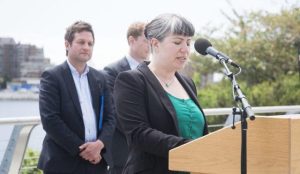British Columbia’s capital of Victoria in Canada on Thursday, May 12, 2022, passed a motion to endorse the Fossil Fuel Non-Proliferation Treaty, a global initiative that aims to address the source of 86% of CO2 emissions that cause climate change: fossil fuels.

Tzeporah Berman, Chair for the Fossil Fuel Non-Proliferation Treaty Initiative and Stand.earth International Programme Director, said: “Our Provincial and Federal governments are still subsiding and approving expansion of oil and gas even though the science is clear that to fight climate change we need to stop expansion and wind down emissions and production. Cities combined their power and influence to call for nuclear non-proliferation decades ago and today Victoria joins many other cities in Canada and around the world calling on our governments to stop expansion of dirty fossil fuel energy and put our money and efforts into building cleaner and safer solutions.”
Last year, British Columbia was the epicentre of major weather extremes within the space of a few months, suffering from dangerous heat and destructive wildfires to record breaking rainfall and catastrophic flooding. The most recent report by the Intergovernmental Panel on Climate Change (IPCC) reaffirms the major urgency to phase out fossil fuels to stave off the worst impacts of the climate crisis and UN Secretary General Antonio Guterres has stressed that “investing in new fossil fuels infrastructure is moral and economic madness”.
Victoria Councillor, Sarah Potts, said: “From fires, floods, to heat domes, people across British Columbia are already facing the devastating impacts of climate change. Every community will inevitably be forced to respond one way or another and a collective, collaborative approach will fast-track solutions and a just transition for every worker, community, and country.”
The City of Victoria declared a climate emergency in March 2019, uniting with cities across Canada that have joined the international movement to address the climate crisis. The city is also making progress toward its target of 100 percent renewable energy by 2050 in an effort to reduce dependence on oil and gas and accelerate collective action on GHG mitigation efforts.
Victoria is the 7th municipality in British Columbia to have endorsed the Fossil Fuel Non-Proliferation Treaty, following Vancouver, Burnaby, New Westminster, North Vancouver, West Vancouver and Richmond. Dozens of others across the globe are also calling for a phase out of fossil fuel production, including Barcelona, Los Angeles and Paris.
Vancouver Councillor, Christine Boyle, said: “In the year and a half since Vancouver became the first city to endorse the treaty, we’ve seen dozens more cities across Canada and the globe join in this call to action. We are thrilled to see this global demand to end the fossil fuel era surge from local communities. But this is increasingly in stark contrast to the action being taken by senior levels of government, not least here in Canada. It is up to us – citizens and municipal leaders – to be courageous, to mobilise and to hold our federal governments accountable.”
The expansion of fossil fuels continues unchecked as there is currently no international mechanism to manage a fair and fast transition away from coal, oil and gas. The Paris Agreement does not even mention them once and in the five years since it was signed, the fossil fuel industry has continued to expand significantly.
The proposed Fossil Fuel Non-Proliferation Treaty is said to be needed as a complement to the Paris Agreement, to facilitate the international cooperation required to manage a fair and fast global transition away from coal, oil and gas.
Emily Lohan, a student at University of Victoria, said: “Governments would rather dilute the science, and lower public expectations on what’s required, than squarely face the true magnitude of this emergency. Thanks to them, we are the frogs being slowly boiled. For my generation, the climate crisis is our Cuban missile crisis. But it’s not a day, it’s not even a year. It’s decades of fear. I’ve spent the better part of my adult life battling fossil fuel expansion and the impending, scientifically well founded, sense of doom I share with most of my generation.”
Dr. Lucy Nerenberg, a local physician & clinical assistant professor at UBC, said: “It is time to protect our endangered health and planet. To pull the emergency brake on this runaway train – then switch the track towards the green valley, not off the cliff. One of the most powerful prescriptions is hope – and a roadmap out of a health crisis. You can help sign this prescription of hope tonight. The future is now, and this is the time to act.”
The campaign for a Fossil Fuel Non-Proliferation Treaty was inspired by treaties that addressed the threats of nuclear weapons, landmines and other dangerous substances. Over the past year the campaign has been supported by 101 Nobel Laureates, 2,600 academics, 231 parliamentarians, hundreds of prominent youth leaders, a growing group of faith leaders and more than 1,300 civil society organisations, including Climate Action Network Canada, David Suzuki Foundation, Citizens Climate Lobby Canada, Climate Strike Canada, Environmental Defence Canada, Fridays for Future Canada and International Physicians for the Prevention of Nuclear War Canada.
